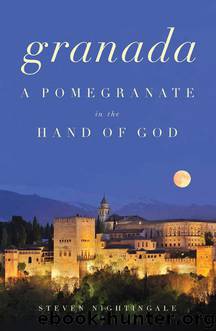Granada by Steven Nightingale

Author:Steven Nightingale [Nightingale, Steven]
Language: eng
Format: epub
ISBN: 9781619025066
Publisher: Counterpoint
THE CATHOLIC MONARCHS RE-CREATE SPAIN IN THEIR OWN IMAGE
It was a pivotal moment in history. Ferdinand and Isabel knew it to be one. They unified Spain, and they looked to the future. Of course they wanted, by the alliances they made with the marriage of their children, to provide for the continued ascendency of their country. Their one son, Prince John, died as a youth. They had had one surviving child, Juana (the unfortunate woman known to history as Juana la Loca—Juana the Mad). Juana married Philip the Handsome, an Austrian Hapsburg, the only son of Emperor Maxmilian the First, Holy Roman Emperor. Philip engaged in a seething fight with Ferdinand, his father-in-law, for power in Spain. He chose the wrong adversary. One day, at age 28, some hours after quaffing a glass of ice water, he sickened and died. Rumors of poison circulated immediately. We shall never know for certain, but we do know that Ferdinand had shown for decades a refined genius for murder from a safe distance. As to Juana la Loca, she showed a profound if not perverse interest in the corpse of her husband, part of the reason she was locked up in a castle for the rest of her life. But after the deaths of Isabel (in 1504) and Ferdinand (in 1516), the first son of Juana la Loca, Charles I, became king of Spain. Three years later, he was crowned Holy Roman Emperor. So did Spain come to be in legal and royal possession of many of the countries and territories of Europe, including Sicily, the Kingdom of Naples, Sardinia, large portions of France (including Provence and Burgundy), Austria, Bohemia, the Low Countries, and Luxembourg. And to all this, of course, they added their incomparable territories in South and Central America and the Caribbean. It is difficult to overstate the magnificence and promise of such a position. And Spain, among all the countries of Europe, had an extraordinary advantage: it was the only country that could bring to the management of these vast domains the most advanced technical, scientific, mathematical, and commercial culture in the whole of the Mediterranean: the culture of Al-Andalus.
It was not to be. Spain chose another course: descent into centuries of war, economic stagnation, rampant corruption, bankruptcy, and scorching misery. So unprecedented was the opportunity, and so elevated its position, that the full collapse required generations to play out. But the road down through the decades and centuries was a precipitous one, and economic and cultural historians have given us a map of the way: the plain facts of what Spain did with what they had.
Just as the Inquisition supplied the world with a template of hatred, so the governance of Spain, beginning with Ferdinand and Isabel, provides a distinct template for national failure. That template has a fixed set of elements. Prominent among them are the union of the state with fundamentalist religion; a preference for debt-financed military solutions to political problems; the destruction of the country’s manufacturing
Download
This site does not store any files on its server. We only index and link to content provided by other sites. Please contact the content providers to delete copyright contents if any and email us, we'll remove relevant links or contents immediately.
| Africa | Americas |
| Arctic & Antarctica | Asia |
| Australia & Oceania | Europe |
| Middle East | Russia |
| United States | World |
| Ancient Civilizations | Military |
| Historical Study & Educational Resources |
Room 212 by Kate Stewart(5091)
The Crown by Robert Lacey(4791)
Endurance: Shackleton's Incredible Voyage by Alfred Lansing(4743)
The Iron Duke by The Iron Duke(4337)
The Rape of Nanking by Iris Chang(4189)
Joan of Arc by Mary Gordon(4080)
Killing England by Bill O'Reilly(3987)
Say Nothing by Patrick Radden Keefe(3965)
I'll Give You the Sun by Jandy Nelson(3417)
Shadow of Night by Deborah Harkness(3341)
Hitler's Monsters by Eric Kurlander(3320)
Mary, Queen of Scots, and the Murder of Lord Darnley by Alison Weir(3189)
Blood and Sand by Alex Von Tunzelmann(3181)
Eleanor & Park by Rainbow Rowell(3139)
Darkest Hour by Anthony McCarten(3112)
Margaret Thatcher: The Autobiography by Thatcher Margaret(3065)
Book of Life by Deborah Harkness(2913)
Red Famine: Stalin's War on Ukraine by Anne Applebaum(2909)
The One Memory of Flora Banks by Emily Barr(2847)
